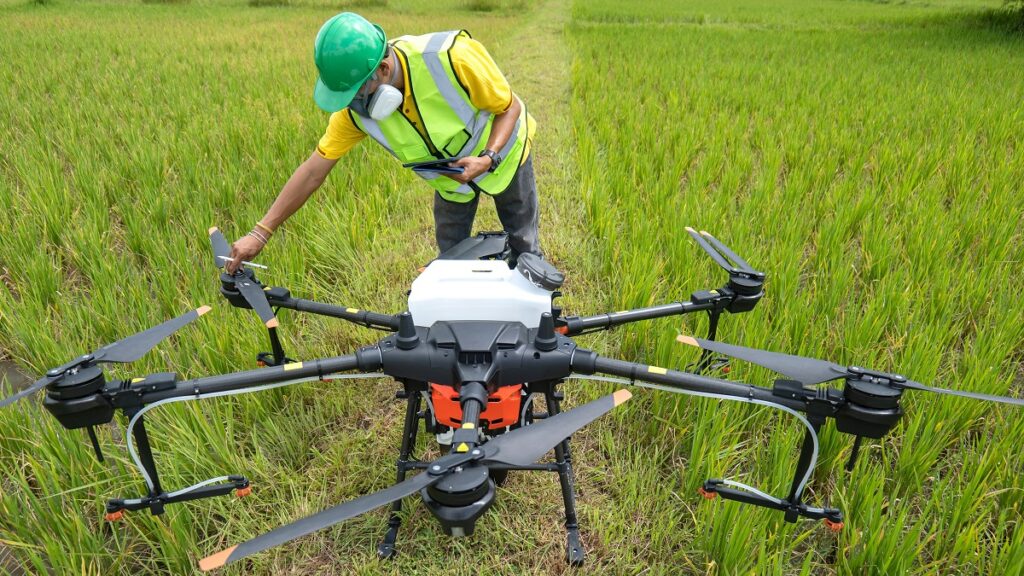Read in
Hawkins Musili – General Manager at Fahari Aviation
Adoption of drone technology in Africa has come a long way. What was once viewed as a foreign concept is now widely adopted across Africa for socio and economic purposes. Its diverse applications on the continent in different sectors and industries have eclipsed many other parts of the world. This proves that if harnessed for good, use of drones will make a difference in how we tackle existing issues within Africa.
A good example to begin with is an unlikely one that has had a huge impact. In East Africa, there has been a race to outsmart desert locusts with drones and data. According to the Kenya Agricultural and Livestock Research Organization (KALRO), one swarm of locusts can comprise of up to four million insects and is estimated to eat food that can be consumed by about 35,000 people a day.
In an aim to mitigate such risks, KARLO, alongside FutureWater and HiView through the ThirdEye project, now provides farmers with important and relevant information on seeds, water, pesticides, and labor to increase efficiency and production. So far, six flying sensor operators have been trained and equipped with tools to analyze the obtained imagery and offer advice to farmers allowing them to scout farm fields quickly and efficiently rather than evaluate their farms manually on foot or by tractor.
Thanks to technological advancements that have made them more nimble, adaptable, affordable, and simple to operate, drones are being used in ways that either directly or indirectly save the environment.
In Zimbabwe, drones are now part of efforts to control infestation of tsetse flies and quelea birds. Further south, agriculture fields could be destroyed by little rainfall, very dry seasons, swarms of pests like the locust invasion in the summer of 2021/22, and outbreaks of disease – resulting in massive losses. The drone systems are developed to monitor pests and illnesses, anticipate yields, inform markets, and help decision-making in land-use planning in addition to making use of earth observation, climate change modelling, big data, and data analytics.
While the potential of drones within the environment and agriculture space in Africa has not even scratched the surface, there is great progress so far as scientists, environmentalists, and engineers use unmanned aircrafts as land surveying tools; lower-resolution satellite photographs assist in mapping and environmental monitoring. Drones are suitable for faraway or hard-to-reach places since they can execute these tasks much more quickly and affordably than traditional methods.
The use of drones in the maritime and shipping industry is another great example of how they are revolutionizing the way safety is managed on ships. Nigeria for instance has procured maritime UAVs for its Deep Blue maritime security project, on the other hand, the Seychelles Fishing Authority recently purchased marine unmanned aerial vehicles (UAVs) with superior artificial intelligence capabilities. By monitoring isolated locations along the Seychelles coastline, these drones will enable real-time observation of ‘target boats and boost search-and-rescue efforts.
By providing a bird’s eye view, drones can quickly survey the entire length of a bridge or port to identify any potential hazards or damages. Additionally, drones outfitted with infrared or thermal sensors, operators can quickly identify any vessels that are in distress, in need of assistance or conducting suspicious activity, allowing for faster response times and improved safety on the open sea.
Drones are clearly a disruptive technology trend with immense potential when used correctly with expanding uses and real-world significance for the continent’s present and future.
It is therefore critical that Africa works toward the same objective of sustainable development in the context of a global environment that relates to technical and digital innovation. The aviation industry must continue to make contributions to the ongoing commitment to dedicate resources and research to finding solutions for Africa to help the development process.
To promote safe and secure use of drones, Kenya Airways’ Fahari Aviation, an aviation technology business subsidiary, has been in the forefront of delivering drone capabilities throughout East Africa. As part of the airline’s plan to promote new directions within the sector with the usage of drones and unmanned aircraft, Fahari Aviation has the responsibility of launching and implementing future aviation technology, train pilots of unmanned aerial vehicles and test drones and drone equipment. Last year, Fahari Aviation unveiled Kenya’s first drone cage. Today, Fahari Aviation sees drones used for a variety of purposes, including, vegetation and wildlife conservation, medical logistics, environmental impact assessment, crisis management and screening, and humanitarian relief across the region.
Drones clearly provide several options for the African continent and can play a key part in the future of Africa by achieving the African Union’s Agenda 2063 goal of creating a unified, wealthy, and self-sufficient Africa. The future will undoubtedly come with more surprises, along with further use of the technology.



